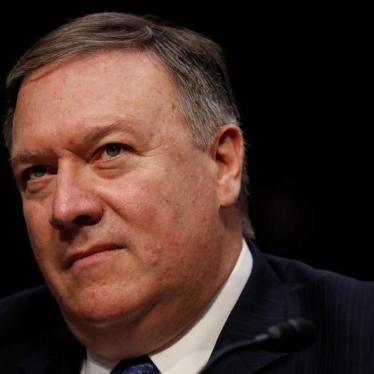Given his record, Mike Pompeo’s Senate confirmation hearing to be secretary of State should have been fiery. Over his six years as a member of Congress, Pompeo built a record of embracing mass surveillance practices, promoting bigotry, championing extreme restrictions on women’s rights, and supporting the Central Intelligence Agency’s use of torture.
Yet his recent hearing was mostly restrained. Pompeo assured senators of his commitment to “engage in diplomacy and model the very best of America to the world.” Not only did senators learn he likes meatballs, golden retrievers and college basketball, but Pompeo sought to convince them that he would support diplomacy over military action, promote democracy as a key tool of U.S. foreign policy, commit to workforce diversity, and defend the rights of lesbian, gay, bisexual and transgender people both as federal employees and as activists overseas — even as he refused to acknowledge that gay sex isn’t a “perversion.”
His record in office, however, shows something very different.
After the 2013 Boston Marathon bombing, for example, the Kansas Republican took to the House floor to accuse American Muslim leaders of being “potentially complicit” in violent attacks in the United States, claiming wrongly that they failed to speak out against attacks by Muslims.
Pompeo also alleged that such behavior “casts doubt upon the commitment to peace by adherents of the Muslim faith.”
On surveillance, Pompeo has suggested that the government should collect records of U.S. citizens’ communications, without warrants and in bulk, and combine them with “publicly available financial and lifestyle information into a comprehensive, searchable database.” If confirmed, Pompeo could use bilateral intelligence-sharing arrangement negotiations to help turn this dangerous desire to erode privacy rights into practice.
As a congressman, Pompeo consistently supported and promoted legislation that would aggressively roll back women’s reproductive rights, with an alarmingly extreme voting record on gender-based violence, global health and reproductive rights. He even voted against reauthorizing the
Violence Against Women Act, legislation that was never a bipartisan battle until the most recent reauthorization.
For decades, advancing gender equality and women’s rights abroad has been a key part of the State Department’s agenda — under both Republican and Democratic presidents. But confirming Pompeo would reinforce the view that women’s rights are divisible and expendable. It could walk back years of progress and support to local groups around the world that have provided life-saving support for women and girls in need.
Pompeo refused to answer hearing questions that would have enabled more transparency and scrutiny of his vision. When asked how he would engage with a country like Egypt, which has an appalling human rights record, he responded by saying, “
Our obligation is to do our best … when we come across a country that’s engaged in human rights violations, things that are inconsistent with our values, we should call them out.”
In theory, that sounds right. But as a congressman,
Pompeo co-sponsored legislationthat urged designating the Muslim Brotherhood as a terrorist organization. My organization, Human Rights Watch, strongly opposes such a move, which would undercut U.S. support for political pluralism overseas while also threatening the
rights of Muslims here at home.
The Muslim Brotherhood was founded in Egypt in 1928 and has evolved into an international movement whose branches effectively operate independently. Most, including the main branch in Egypt, promote ideas through social and political activities. After the Egyptian military
forcibly removed the democratically elected president, Brotherhood member Mohammed Morsi, in July 2013, it designated the Muslim Brotherhood a “terrorist organization.” And Egypt has systematically cracked down on almost all peaceful political opposition, including the Brotherhood’s, as well as on independent activists. A similar U.S. designation would wrongly equate the Brotherhood with groups such as al-Qaeda and endorse Egypt’s actions — just the opposite of what Pompeo suggested during his hearing.
Recent news that Trump sent Pompeo to hold
secret meetings with North Korean leader Kim Jong Un might assuage concerns of some senators about his ability to be the nation’s top diplomat. In reality, this move says more about Trump and how he conducts diplomacy than whether the Pompeo presented at the Senate hearing is what America will get.
The absence of Pompeo’s candor before the Senate should now raise more concern, not less.
Nominating Pompeo was a clear sign that Trump wants a secretary of State who will wield his disdain for universal human rights; a regressive approach to gender, health and reproductive rights; and an anti-Muslim worldview. That’s why Human Rights Watch, along with at least
180 foreign policy-oriented non-profits and the largest domestic civil and human rights coalition, the
Leadership Conference on Civil and Human Rights, opposes Pompeo to be the chief U.S. diplomat.
The Senate Foreign Relations Committee should lead the way for the rest of the Senate by rejecting Pompeo’s nomination. Confirming individuals who seek to reverse U.S. commitments on human rights and the rule of law while normalizing discriminatory rhetoric cannot — and should not — become the new American way.







